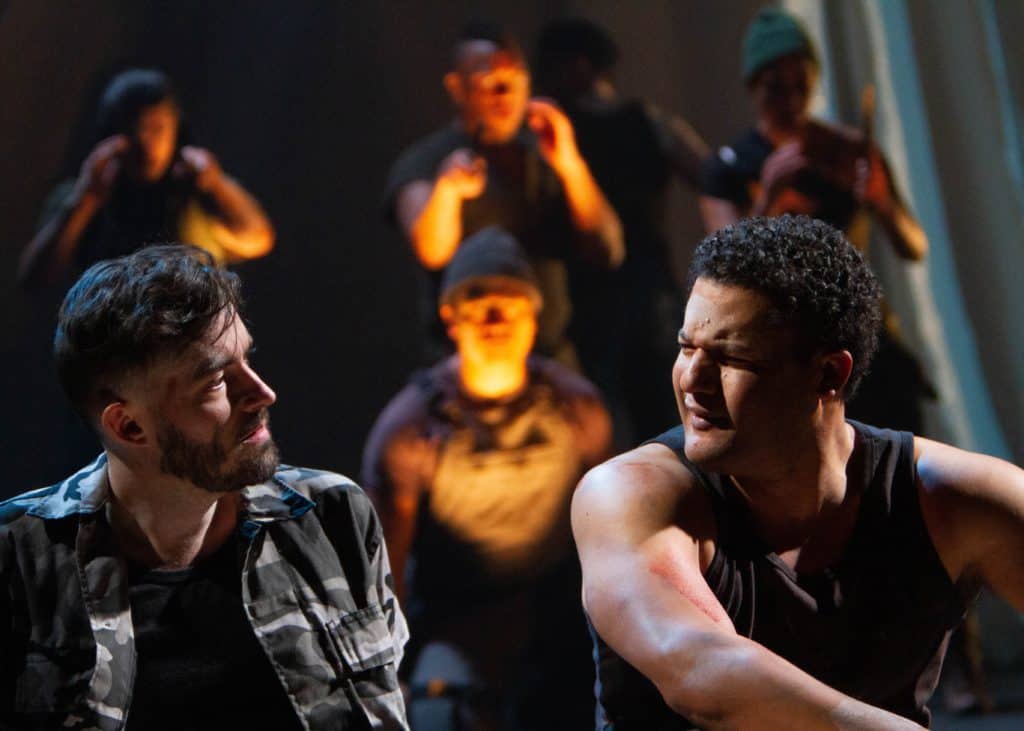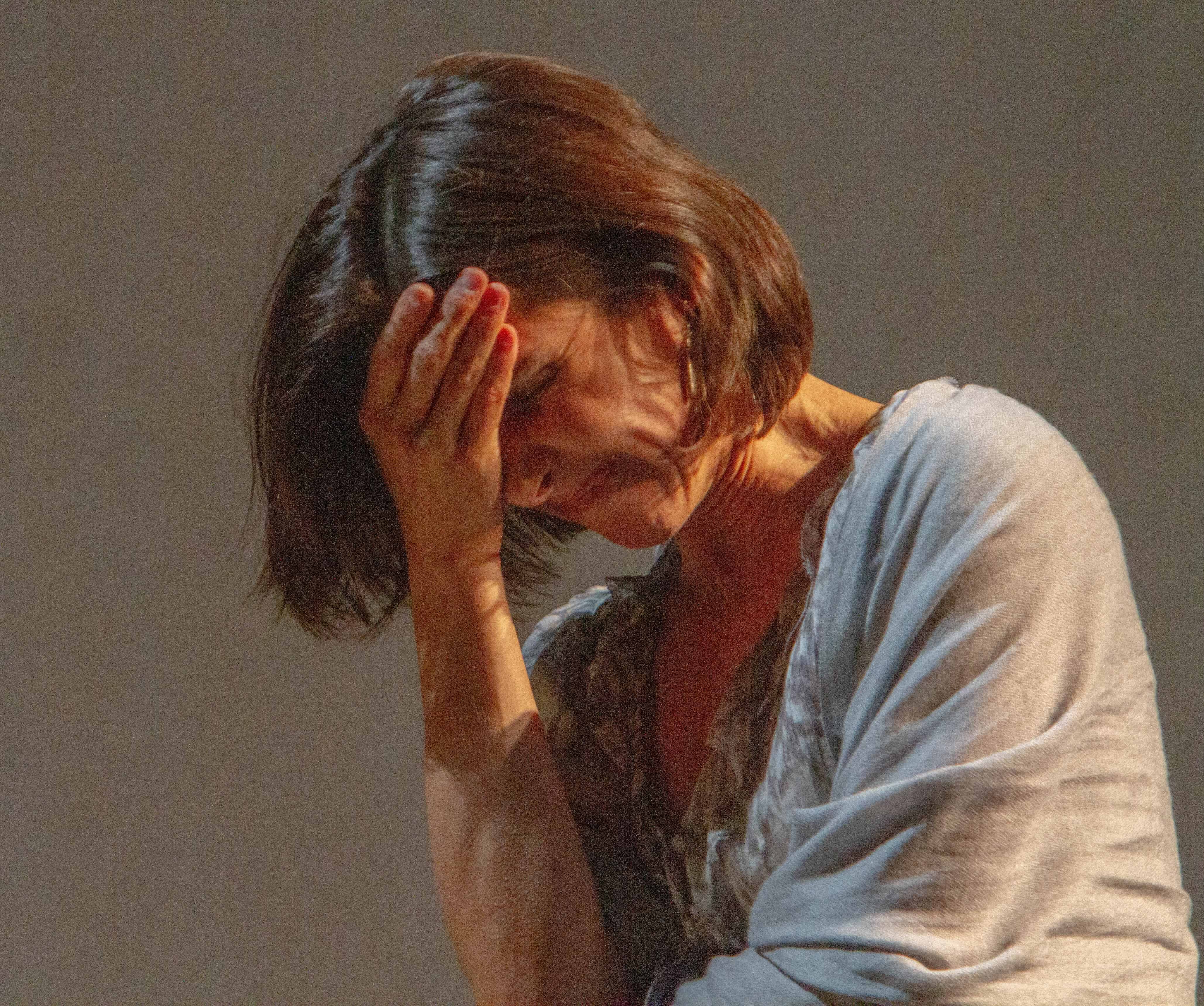Through April 28, Theatre for a New Audience presents a clear and forceful production of Shakespeare’s 1599 tragedy, “The Tragedy of Julius Caesar.”
Director Shana Cooper’s take is a great lucid rendering that accentuates the plays core themes and conflicts, even as the production careens into one too many air-knife-fights that turn the tragedy into a Mortal Combat training site. But the acuity of the set, sound, costume, and cast is so well done that Cooper, who was associate artistic director at California Shakespeare Theater and directed a version of this two years back at the Oregon Shakespeare Festival, should be applauded.

Set Designer Sibyl Wickersheimer evokes the ruin to come with towering, glaucous white walls that frame the stage, parts of which will literally crumble even before the names of the moment’s political offenders are written on a scroll and strung up as a calling for their death. Mobs crawl the rampart and surge below the stage, mimicking the sense of instability and chaos that’s burgeoning in Shakespeare’s text. Wickersheimer ensures that there are clean lines to the drama of the main characters, especially the death scenes which, as murder orchestration goes, are fantastic.
The pulsing light – low-tone ambers and bristling shocks of white – can be overkill, but for the most part, they serve as an adept background character. The lighting (Christopher Ackerlind) is extremely powerful in transitions, along with the sound design (Paul James Prendergast), which coordinate flawlessly together to draw out the play’s cogent themes of envy, misunderstanding, honor, and dignity. With all the elements of a production solidly in key, it was left to the cast to deliver.
And they by and large delivered. It seemed palpable that Brandon J. Dirden’s Brutus was a crowd favorite. His movement, flow, and expression defined the character so finely. He became quite the screen to watch the internal strife that Shakespeare envisioned.
Matthew Amendt’s Cassius was good but uneven, especially with the accent (did I detect a hint of an Irish brogue?). But he may have been finding his sea legs still in previews. There were moments when he powerfully conveyed the envy Cassius felt toward Caesar, who recently banished a rebellion led by General Pompey and who habitually welcomes him in the coldest of terms. Amendt brought a level of sympathy to Cassius’ fury that was enticing. I found myself wanting to know more why he acted this way; what caused him to lead Brutus to a deed that was previously unimaginable.
Mark Antony was similarly powerful but wobbly. Jordan Barbour has the flair of Todrick Hall, which works well as a coy pre-death-of-Caesar Mark Antony, but not so much as the Caesar protege who leads an army to avenge his father figure’s death.
This production has an admirable irreverence for gender norms. Why, for instance, was Cicero (Emily Dorsch) not only played by a woman but also dressed like Dana Scully? It’s not really explained, and I don’t even feel the need for an explanation as Dorsch carried on with such confidence. Other costumes mix beanies, café-chic, and Casual Friday business wear. I was especially fond of Brutus at home looking cozy in Gap sweater and jeans.
But maybe the more contemporary clothing serves a point. It does remove an obstruction to character. In looser garments that we recognize as normal and that can fade into the background, we focus more on character and the personal/political turmoil of each one.
This need to pave the way to a new audience may also explain the decision to sand off the anachronistic bits of the play. This edited version preserves, for the most part, the play’s poetry, and it certainly protects the marquee lines – The fault, dear Brutus, is not in our stars; Not that I loved Caesar less, but that I loved Rome more; Et tu, Brute (Which Rocco Sisto as Julius Caesar delivers with tear-jerking agony).
This production brings to the fore the power and danger of revolution. Brutus, after much agonizing, decides to help kill Caesar, fearing what he believes to be an unquenchable thirst for power. But then Mark Anthony, slyly managing to stay alive and deliver a seemingly innocent defense of Caesar, gives a stirring oration that incites public wrath against Brutus & co. It seems that the power broker was actually benevolent and perhaps (perhaps!) shouldn’t have been murdered. Yet for all his skillful rhetoric, the audience is unlikely to trust Mark Anthony, or even Brutus, leaving us in the unstable situation of being able to trust no one.
And that is one aspect of this tragedy that is rarely illuminated: there are no stable resolutions when it comes to approaching utopia. Mob rule can bring down noble people. Yet noble people can act unjustly, twisted as they are by soothsayers. When Portia (the marvelous Merritt Janson) pleads with Brutus, her husband, to let her into his internal strife, he’s unable to open himself up. That personal silence that intertwines with the political is, to my mind, the real tragedy.
With the recent uproars over effigies of Trump or Obama being placed as Julius Caesar, this production is a refreshing take that avoids such easy connections to contemporary politicians. In immersing itself in the play rather the present moment, it minutely captures the conflicts within each character. In pitting psychic and political conflicts so clearly against one another, Cooper & co. show why this play endures: not because it mirrors our current political situation, but because it informs our existence.
Polonsky Shakespeare Center. 262 Ashland Place. Through April 28. Tickets start at $90.










